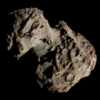| Discovery | |
|---|---|
| Discovered by | Catalina Sky Survey |
| Discovery date | 6 May 2005 |
| Designations | |
| Alternative designations | 2005 JQ5 |
| Orbital characteristics | |
| Epoch | 6 April 2023 |
| Observation arc | 13.6 years |
| Aphelion | 4.565 AU (Q) |
| Perihelion | 0.83207 AU (q) |
| Semi-major axis | 2.6985 AU (a) |
| Eccentricity | 0.69165 |
| Orbital period | 4.43 years |
| Inclination | 5.6740° |
| Last perihelion | 11 April 2023 2 November 2018 |
| Next perihelion | 13 September 2027 |
| Earth MOID | 0.0245 AU (3.67 million km) |
| Physical characteristics | |
| Dimensions | 1.4±0.1 km |
| Geometric albedo | 0.033 |
300P/Catalina is a periodic, near-Earth comet in the Solar System with an orbital period of 4.4 years. It is the second comet ever listed on the Sentry Risk Table. At 1.4 kilometers (0.9 miles) in diameter, it is one of the largest objects ever listed on the Sentry Risk Table.
It was discovered on 6 May 2005 as 2005 JQ5, and listed on the Sentry Risk Table with five virtual impactors starting in 2041. On 17 May 2005 it was designated as comet P/2005 JQ5 (Catalina). It was removed from the Sentry Risk Table on 7 June 2005. It was observed by Arecibo Observatory on 12 June 2005.
300P/Catalina makes close approaches to Earth and has an Earth-MOID of 0.0245 AU (3,670,000 km; 2,280,000 mi). On 8 June 2036 the comet will pass 0.0536 AU (8,020,000 km; 4,980,000 mi) from Earth.
June epsilon Ophiuchids
300P/Catalina is suspected of being the parent body of the minor June epsilon Ophiuchids meteor shower. There was an outburst of meteor activity from 19 June 2019 until 26 June 2019 when 88 June epsilon Ophiuchids were detected by the Cameras for Allsky Meteor Surveillance (CAMS) network. The June epsilon Ophiuchids created 50% of the fireball detections in the period 22–24 June. This outburst offers evidence of past activity of 300P/Catalina. The radiant is near 16:21 (245.2) -7.4 in the constellation of Ophiuchus. The June epsilon Ophiuchids radiate from a very large scattered radiant area and may be related to a number of other minor showers that have been identified. The meteors have a velocity of around 14 km/s.
References
- ^ "MPEC 2005-J29 : 2005 JQ5". IAU Minor Planet Center. 8 May 2005. Retrieved 5 July 2019. (K05J05Q)
- ^ "300P/Catalina Orbit". Minor Planet Center. Retrieved 5 July 2019.
- "Horizons Batch for 300P/Catalina (90001248) on 2027-Sep-13" (Perihelion occurs when rdot flips from negative to positive). JPL Horizons. Retrieved 2 May 2023. (Soln.date: 2023-Apr-25)
- ^ "JPL Small-Body Database Browser: 300P/Catalina" (last observation: 2019-01-01). Jet Propulsion Laboratory. Retrieved 5 July 2019.
- ^ Harmon; Nolan; Margot; Campbell; Benner; Giorgini (2005). "Radar observations of Comet P/2005 JQ5 (Catalina)". Icarus. 184 (1): 285–288. arXiv:0712.4204. Bibcode:2006Icar..184..285H. doi:10.1016/j.icarus.2006.05.014.
- David L Chandler (1 June 2005). "Comet put on list of potential Earth impactors". New Scientist. Retrieved 5 July 2019.
- "Sentry Risk Table Archive". NASA/JPL Near-Earth Object Program Office. Archived from the original on 10 May 2005. Retrieved 5 July 2019.
- "CRT 2005 Object Archive". hohmanntransfer. Archived from the original on 15 June 2011. Retrieved 5 July 2019.
- Andy Howell (3 July 2019). "CAMS Observes Outburst of the June Epsilon Ophiuchid Meteors". Meteor News. Retrieved 5 July 2019.
- ^ Paul Roggemans (7 July 2019). "June Epsilon Ophiuchids (JEO#459), 2019 Outburst and an Impactor?". Meteor News. Retrieved 8 July 2019.
- "June Epsilon Ophiuchid Meteors". Central Bureau for Astronomical Telegrams. 29 June 2019. Retrieved 5 July 2019.
| Numbered comets | ||
|---|---|---|
| Previous 299P/Catalina–PANSTARRS |
300P/Catalina | Next 301P/LINEAR–NEAT |

